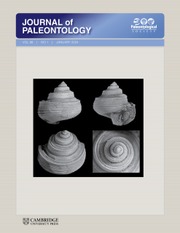
I want to thank Professor Meyer for the introduction and for nominating me for this most prestigious award. I want to sincerely thank the Paleontological Society for awarding me this honor. I appreciate that a number of professionals wrote letters of support on my behalf and I want to express my gratitude to all who helped me achieve this recognition.
Contingencies direct and redirect us all in life and it is a long series of contingencies that brings me here tonight. There is a common thread though, and that is the people whom I met along my path. These people deserve specific recognition.
My cousin had interested me in Cincinnati Ordovician fossils as a child and like most of you, I never lost my interest. It was through another hobby later in life (one of those contingencies) that I met Stuart Wheeler who became my mentor in the world of Cincinnati fossils. Stu taught me collecting techniques, the value of the older literature, how to do literature research and above all he introduced me to the Dry Dredgers.
The Dry Dredgers organization presented a significant learning opportunity. Here was an organization of amateur paleontologists that worked hand in hand with professional paleontologists and their students for the advancement of the science. The credit for the existence of this organization goes to the foresight of Professor Kenneth Caster at the University of Cincinnati in 1942. Ken realized how the contributions from an army of dedicated amateurs could benefit research. He was proven right throughout his celebrated career.
By the time I joined the Dry Dredgers, Ken Caster was an emeritus professor and he had turned the role of club advisor over to a young professor named David Meyer. Meeting Dave was another turning point in my life. As an enthusiastic beginner I inundated Dave with questions after every meeting. As I learned more, Dave welcomed me to U.C., where he allowed me access to the U.C. collections for my work on research projects.
It was through Dave and the Dry Dredgers that I met other professional paleontologists. This included Stephen Donovan who invited me to coauthor a paper based upon some of my own fossils. This first foray into publishing made me long to do more.
I had met Bill Ausich through Dave as well. That connection led to our recent paper published in the Journal of Paleontology. That fulfilled many of my dreams—getting published in the Journal of Paleontology; naming a fossil animal new to science; and being listed as first author.
Professor Bruce MacFadden of the University of Florida deserves thanks as well since it was through his FOSSIL Project that I became aware that my experience with the Dry Dredgers was somewhat unique regarding professional/amateur relationships.
I regret that time does not permit me to thank each of my friends in the professional and amateur ranks. In preparing for this acceptance speech, I made a list of all who have influenced me in my learning experience. They number in the dozens and naming even a few more would not be fair to the many others who have helped me along the way.
The key to my being here tonight revolves around the Dry Dredgers and our shared common goals for educational outreach and advancement in paleontology. To that organization, I owe my sincerest gratitude.
In conclusion, it is the greatest of honors to receive the Harrell L. Strimple Award. It embodies the highest regard that the Paleontological Society has placed upon amateur/professional relationships. I want to encourage you to seek out amateurs. With your encouragement, guidance, and training, they will continue to contribute significantly to paleontology.
Thank you again for this honor.


